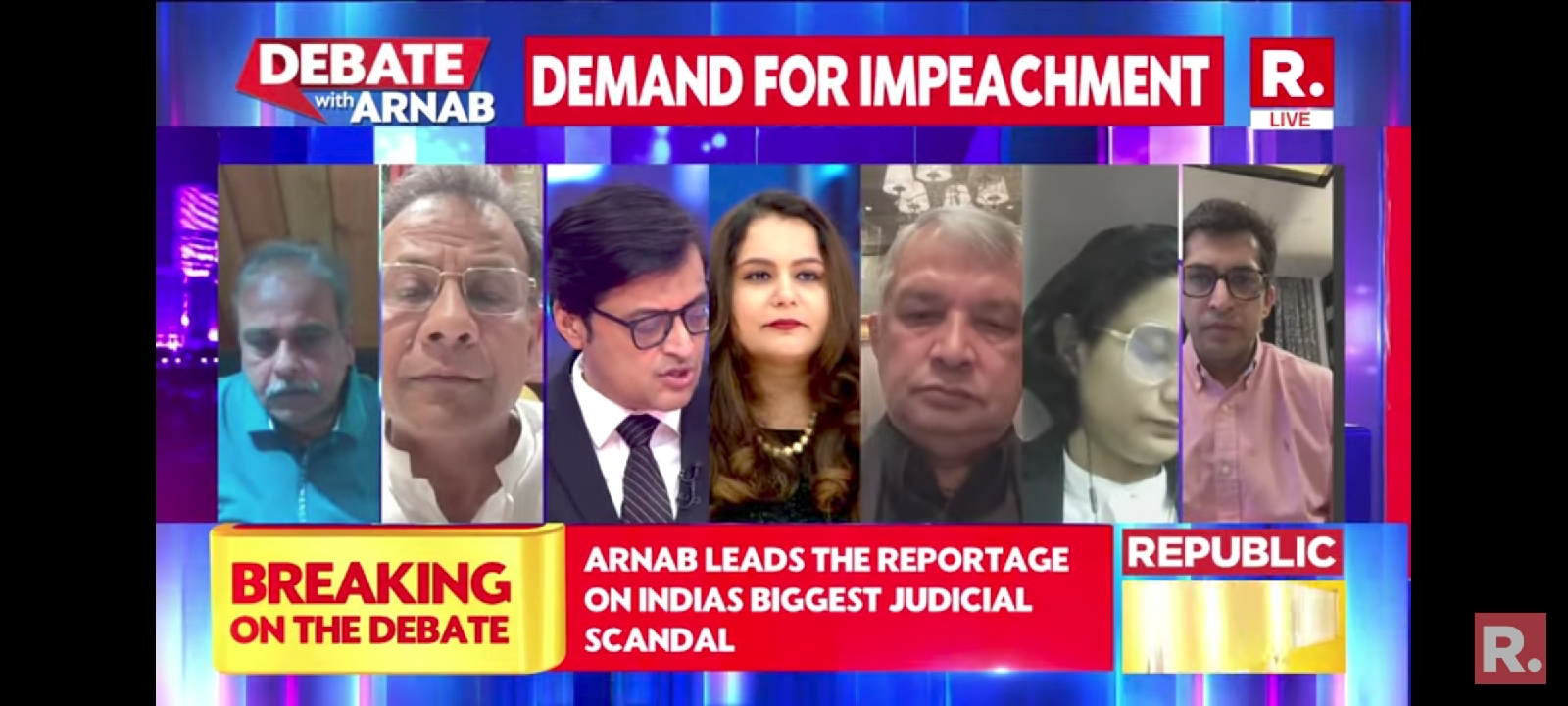Why CJI Sanjeev Khanna Made a Mistake?
In a heated debate on Republic Media Network Arnab Debated with Mahesh Jethmalani,and other panelist gave their opinions and debated regarding the integrity and accountability of India’s Supreme Court, the panelists voice their deep concerns about the judiciary’s handling of corruption allegations surrounding Justice Yashwant Varma. The discussions revolve around the recent discovery of a substantial amount of unaccounted cash found at Justice Varma’s residence and the subsequent transfer of the judge. Critics argue that the swift transfer without a comprehensive inquiry is not only inadequate but also reflects a cover-up mentality within the judiciary. The panelists argue for greater transparency and demand a thorough investigation to restore public faith in the judicial system, stressing the need for accountability among judges. The growing perception of judiciary’s indecisiveness raises fundamental questions about the institution’s credibility and its ability to maintain its integrity in the face of serious allegations.
Highlights
📉 Concern Over Supreme Court’s Indecisiveness: The panel expresses worry over the Supreme Court’s perceived indecisiveness in addressing corruption within its ranks.
⚖️ Transfer as a Cover-Up: Participants highlight the pattern where judges facing corruption allegations are simply transferred, arguing that this practice lacks accountability.
🗣️ Call for Transparency: Panelists demand transparency and clarity in the processes surrounding the judiciary to restore public trust.
🔍 Need for Investigation: There’s a consensus that a proper investigation into the allegations against Justice Varma is necessary to uphold judicial integrity.
🇮🇳 Impact on Public Faith: The discussions point to a concerning decline in public faith in the judiciary due to mishandling of corruption allegations.
✋ Judges and Accountability: The need for judges to be held accountable, just like any other public servant, is emphasized throughout the conversation.
🛠️ Reassessment of Judicial Protections: Calls are made to reassess judicial protections to prevent misuse, ensuring that no judge is above the law.
Key Insights
📉 The Supreme Court’s Reaction to Ineptness: The Supreme Court’s sluggish response to corruption allegations, particularly in light of public scrutiny, underscores a fundamental issue in institutional accountability. As public faith wanes, the judiciary’s failure to engage aggressively with accusations of misconduct risks undermining the rule of law.
⚖️ Inadequacy of Transfer as Punishment: Merely transferring judges who are implicated in corruption is perceived as an inadequate form of accountability. This practice not only fails to address the gravity of allegations but also sets a dangerous precedent, suggesting that judges can avoid deeper scrutiny through mere relocation.
🗣️ Demand for Transparency: The discussion highlights the urgent need for transparency in the judicial processes. The opaque nature of internal inquiries serves to further fuel suspicion among the public, making it imperative that the judiciary clearly communicates its actions and the reasoning behind its decisions.
🔍 Importance of Rigorous Investigations: A strong call from the panelists for rigorous investigations into the allegations against Justice Varma reflects a broader demand for systemic accountability. Many express the notion that without thorough inquiries, the integrity of the judiciary cannot be guaranteed.
🇮🇳 Public Trust is at Stake: The mounting public concern regarding the judiciary’s credibility demonstrates that widespread allegations and the perception of corruption can jeopardize the fundamental trust that citizens place in their legal system. The judiciary must act decisively to restore that trust.
✋ Judicial Accountability as a Necessity: There is a palpable consensus among the speakers that judges must be held to the same standards as other public officials. This equals accountability and transparency, minimizing the perceived double standards within judicial governance.
🛠️ Reevaluation of Judicial Protections Needed: The conversation indicates that the protective measures currently in place for judges may be prone to misuse, thus necessitating reevaluation. Without proper checks and balances, the judiciary’s integrity is likely to be compromised, jeopardizing the institution’s credibility.
Conclusion
The heated exchange serves as a critical reflection on the current state of the Indian judiciary concerning allegations of corruption, focusing on Justice Yashwant Varma’s case. The consensus among the panelists is an urgent demand for a thorough investigation into the actions surrounding the allegations, a reevaluation of the practice of transferring judges implicated in corruption, and a commitment to enhanced transparency within judicial processes. As public faith in the judiciary is essential for a functioning democracy, the integrity of this institution must be strengthened through accountability to ensure that it lives up to its vital role in upholding justice. The participants, while expressing their dismay at the current trajectory of the judiciary, ultimately highlight the necessity for structural reform to reaffirm its commitment to upholding the law without prejudice or influence.









Comments
Post a Comment